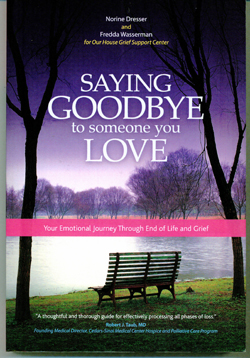Saying Goodbye by Someone You Love by Norine Dresser and Fredda Wasserman, Demos Medical Publishing, 2010, ISBN 978-1-932603-85-9, 210 pages including index, $16.95.
By Donald H. Harrison

SAN DIEGO — Folklorist Norine Dresser suffered the loss of her longtime husband, Harold. Fredda Wasserman is a grief counselor. They became friends, which eventually led to their collaboration on this 13-chapter book on how to prepare for a spouse or companion’s death, on death itself, and on what the survivor might do afterwards. It is a pragmatic book, lightened with numerous anecdotes and some humor. I read it because I am a journalist and a book reviewer, but I suspect that the authors are correct in their assessment that most people who pick it up will be facing a loved one’s imminent death, or have just gone through such a situation.
If this book has a message, it is that we need to be honest with ourselves and with each other when facing death. We can’t pretend it isn’t there. If you’re dying, you’ll probably want to talk about it – possibly about your fears, or about the things that you felt you’ve accomplished in your life, or what you would like done after you die. If you are the spouse or companion, you too may have questions – and you shouldn’t burden yourself with the idea that speaking about your loved one’s death may hasten it. The authors counsel that one shouldn’t give up hope, but neither should one deny the inevitable.
 Once the imminence of death is acknowledged, couples can arrange their lives to be together so as to maximize the time they have left. They can visit people and places that they have loved, or that they always have dreamed of going. If the patient no longer is mobile, they can spend time together at quiet pursuits, listening to favorite music, perhaps playing quiet games, having friends come to visit. Hospice care—whether at home, or at a facility—will relieve the dying partner of the stress of medical treatments and keep him or her comfortable as natural processes occur.
Once the imminence of death is acknowledged, couples can arrange their lives to be together so as to maximize the time they have left. They can visit people and places that they have loved, or that they always have dreamed of going. If the patient no longer is mobile, they can spend time together at quiet pursuits, listening to favorite music, perhaps playing quiet games, having friends come to visit. Hospice care—whether at home, or at a facility—will relieve the dying partner of the stress of medical treatments and keep him or her comfortable as natural processes occur.
Many of us Jews try to say the sh’ma – the affirmation of our faith in the oneness God— as we feel ourselves dying, whereas people in other religions have other customs for the dying and for the loved ones who gather around them. Similarly there is an entire catalogue of rituals that vary by religion and ethnic group around the rites of burial, memorials and grieving. All these are covered in this helpful book, along with ways that third parties can ease the lives of those who grieve, and ways mourners eventually can fashion for themselves new lives.
One intuitively understands that there is no right way or wrong way to prepare for death, nor to cope with it afterwards. Author Dresser weaves into the story anecdotes from her own husband’s death, but the book intentionally transcends her personal experiences so that any reader, whatever his or her background, can benefit from it.
A long time ago, Nancy and I purchased graveyard plots, figuring we’d obviously need them some day and that real estate prices – even for such small plots of land as these – go up every day. I’ve been with friends who have had to buy a grave in the midst of the turmoil of a loved one’s death, and it’s really not a very comforting process. I would recommend that people read Saying Goodbye by Someone You Love well before they, or people close to them, are dying. It will leave a lasting impression—upon which you can draw when the time comes.
*
Harrison is the editor of San Diego Jewish World